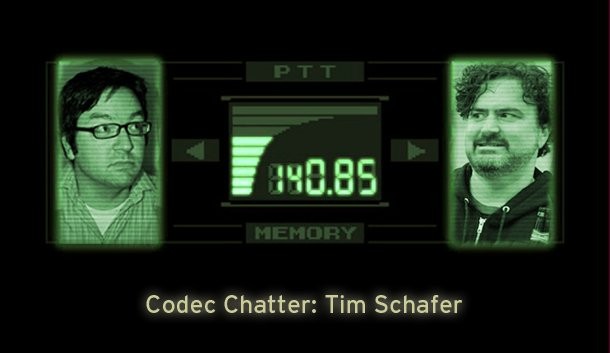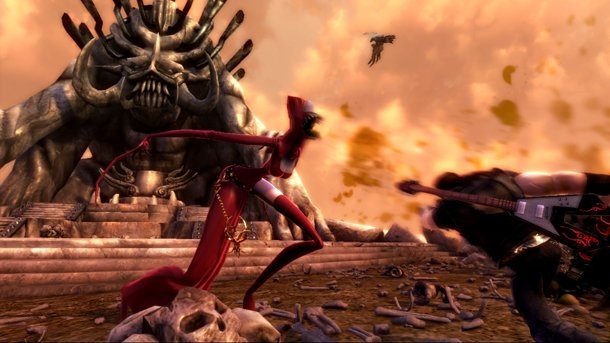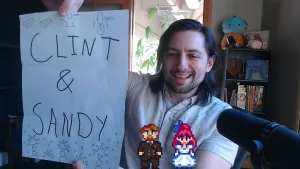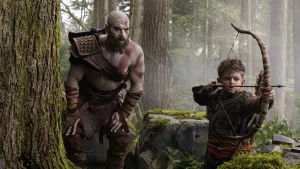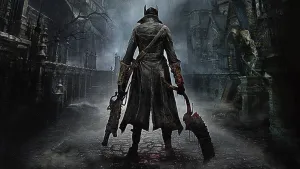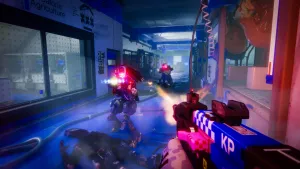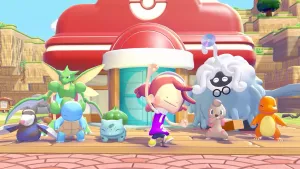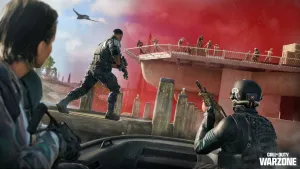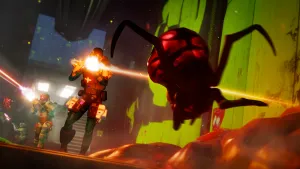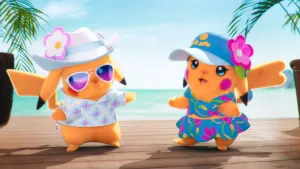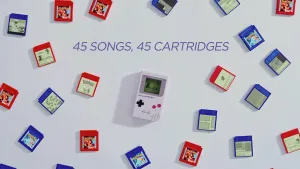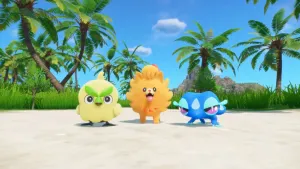Codec Chatter: Tim Schafer
In our fourth installment of Codec Chatter, we talk to Tim Schafer right before his Brutal Legend is set to launch. Schafer talks about writing for his heroes, how fatherhood has changed his outlook and, of course, heavy metal.
At this point, the game’s coming out in less than a week. Is this a nerve-wracking period for you, or is it pretty much old hat?
It’s fun. Keeping something under wraps for four years, it’s nice to be able to get reactions from people and get them to play it. When you’re doing something creative, you really want to share what you make, but it’s hard in games because it can take four years to be able to share it.
And then you’re the lucky guy who gets to go on all the television programs and everything. I guess there’s a lot of responsibility to having Tim Schafer’s name on the box.
Yeah. I would love to give that traveling duty onto someone else, because if I never see another airplane again I’ll be a happy guy. But it’s cool. It’s great, because I’ve never done this much press. On Psychonauts they had one press day. This one has been this worldwide tour ending with national television, which is exciting.
So what do you think changed? Why all the attention? Are you more well known now? Is it your game or changing attitudes toward games?
It wasn’t that Majesco didn’t have good intentions, but they’re just a smaller company than EA. EA is a huge company, they have a lot of resources. They know how to launch new IPs. I think also the game gets more people excited. It has all these things that lure people in. It’s got the music, it’s got the look of it, it’s got Jack Black and all these gods of metal in it. It’s an attention-getting game.
I was thinking about it, and it seems like the age of the Internet ruined a lot of the mystique around heavy metal. I remember as a kid hearing about Ozzy biting the head off a bat, and it was information that was passed around like a legend. Pro wrestling was the same way; it had all this pageantry around it, and you couldn’t always tell what was real. Is that stuff still there, and we just don’t see it because we’re older and wiser?
I don’t know. I’m no expert in the zeitgeist, but it seems like back then, you’re young — in your teen and *** years — and you kind of like the drama of some of that stuff. You’d like the makeup on Kiss and all the ridiculous stuff that goes on. And then at a certain age in your teenage years, you go, “Everything must be taken completely seriously. There’s no fun allowed.” And I think that’s where thrash metal came from. I think the guys that really got into Metallica and stuff, there’s no joking around there. It’s like, “We are going to f***ing thrash now.” It’s funny, because nowadays you see people like Steel Panther, kind of like parody bands, wanting to be satirical about it, but there are also bands like Three Inches of Blood just wanting to revel in the fantasy elements of heavy metal. I don’t know if it’s a personal thing, where you start to learn to enjoy and lighten up a bit and enjoy what’s both fun and serious about heavy metal, or if it’s just the public itself going through these cycles of taking something seriously and too seriously and then rejecting it and then embracing it a little less seriously.
Something that fits into that is Manowar. Those guys were ridiculous. The Orson Welles narration and all that stuff.
Well you start liking it ironically, like, “I’m going to like this as a joke,” and then you start to like it for real, and you don’t know where that slip happens. It’s like when you’re younger and you call her honey as a joke because you want to sound like Ricky Ricardo, like, “Hey honey, I’m home.” It’s a joke, but at a certain point you start calling her honey for real. It’s like, “Wait, when did I stop kidding about that. When did I actually start liking Manowar?”
And contemplating wearing a fur vest. Your games have a reputation for jumping all over the spectrum in terms of setting. If you’re a novelist and you write a mystery and people like it, there’s bound to be some resistance when you tell your publisher you’re following it up with a sci-fi epic. Is that something you’ve encountered?
You actually get that more from the fans than anyone else. If you make a game right, people are going to want more of the same, but deep down I know I would not be serving them well if I did give them more of the same. That’s not really what’s good for anybody. It’s not like I’m against sequels. I think a lot of the games you could make good sequels out of – and Brutal Legend especially, since we had to cut so much stuff out of it just to get it done in four years, it could be good for a sequel. But people want you to stay with graphic adventures, which is something there was definitely this pressure to do. In general, I guess I don’t know if I’m superstitious or just feel like if you don’t follow your inspiration and do what you’re most excited by, no matter what it is and what a departure it is from what you last did, you have to be true to that or else you’ll lose it. You have to honor your inspiration or else your inspiration will move on and find somebody else.
I think that’s something that a lot of people don’t appreciate. A game pops up and they’re like, “Hey, this is a fun game about heavy metal,” and they forget or don’t know that you’ve been living this thing for four years.
And thinking about it for years before that.
Exactly. So maybe it’s a little more interesting for you to move onto something else after that instead of being stuck in the rut of doing the same thing over and over again.
Because that’s not what leads to better, more creative things. You have to kind of run around with ADD and pursue whatever crazy idea comes into your head.
How was it making a multiplayer game?
It was fun, because I’ve never made a game that the people in the office who made it actually wanted to play. No one wants to play an adventure game while you’re working on it, because there’s no mystery or discovery in there. Nobody is going to laugh at the jokes, because they’ve already heard them all a million times and everyone knows the solutions to the puzzles. You can’t really have fun while you’re making an adventure game. But with a multiplayer game, people were playing it in the office and playing it with each other and we’d have these big tournaments and get-togethers where we’d play the game. It was a lot of fun. That was really rewarding for me, to make something that was just so intrinsically fun.
The RTS elements are an unusual addition to an action game. How did you balance simplicity and accessibility, for people who might not have experience with that stuff, versus having something that’s deep enough to be rewarding for players in the long term?
It’s interesting, because it’s not really an RTS game at all. It started as an inspiration from the game Herzog Zwei on the Sega Genesis. That’s definitely where a lot of the gameplay ideas game from. That’s what it started as, as a multiplayer, head to head game. We made the single player later. As we started working on it, we thought wanted this to be a game not for hardcore RTS heads, but something that anyone could pick up and play, like an action game. So it got simpler and simpler. We don’t have any base building. We don’t have multiple resources and man dancing. I think if people into the game trying to play it as an RTS, they’d be kind of frustrated, because RTSs require a certain amount of clicks per second, and man-dancing your units around, moving the guys around and watching their health bars. That’s not how we intended people to play Brutal Legend. You can get into the strategic elements of what units work against what other units and where you should invest in teching up, if you want to get into that. But you can also get into it if you just want to go harass the enemy troops or play an awesome guitar solo. People who are successful at the game tend to keep their troops together in one big army. There are mechanics for splitting up your army, but mostly keeping it together and treating it like this overwhelming force that helps you along the way is really how we play it around the office. In some ways, I’m more worried about, even though we have a deeper strategy in there if you want to seek it out, I’m more worried about people approaching it like, “Oh, I played StarCraft, I’m going to play Brutal Legend the same way.” It’s not that experience.
When you were writing dialog for the game’s characters, did you write it specifically for the musicians you got, or as archetypes like, “This is something that an Ozzy type would say,”?
The one good thing about being a procrastinator is that I put off writing the dialog until really late in the project, so I knew who everybody was going to be. I didn’t write any of Eddie Riggs’ dialog until I knew that Jack Black was going to play that character, so it made it a lot easier for me, because I could say, “What would be funny to hear Jack say?” or “What kind of dialog do you think I could get out of Lemmy?” They all have different strengths. Lemmy is just so Lemmy; his voice is just so perfect the way it is, but he’s not a trained actor. So you have to write stuff that sounds like Lemmy talking, whereas Rob Halford, he’s not an actor either, but he has this crazy range and he can do this flamboyant General LionWhyte voice so well. Writing stuff that would be fun for him to say was totally a different experience. And then Tim Curry was just a blast. I’d just write stuff because I wanted to hear him laugh his crazy Tim Curry laugh. So I put a lot of those in there.
Did they seem pretty comfortable with what you wrote for them?
Everyone got really into it, and the only person who rejected lines was Lemmy. Sometimes he’d be like, “Oh, what’s this line?” I had him saying, “Top notch,” at one point, because that’s what he says at the beginning of “Another Perfect Day,” the album. The guitar’s tuning up, and you hear him go, “Top notch!” So I wanted him to say that in the game, and when I put that in the game he got to the line and said, “Oh, what’s this? Top notch?” I say, “Oh, it’s a line like you said in that album. You don’t like it?” “It just doesn’t sound like something my character would say.” “Well let’s change it then, because I’m so glad that you care enough to know what your character says.” I was happy that he was into it enough to think about what his character would and wouldn’t say. So I was happy to change it for him.
Was working with Jack Black a pretty collaborative experience, too?
He really works his lines. He does like 20 takes of every line. He really wants to get them right. Sometimes his takes would meander off into these improve-ey areas, and sometimes those lines would be really, really funny, and we’d end up using that version of the line instead. Or sometimes we’d be like, “OK, we got it,” and he’d think that we were done, so he’d do one more line as a joke, and that would be the funniest one. You really have to be on your toes and flexible in the studio and be willing to change the dialog. That’s the great thing about being in the studio when you’ve written the dialog, you can totally rewrite stuff on the fly. If you know what all the ins and outs of the game design are, you can make it serve the game or be a hint. Sometimes you think, “Ooh, if we change this line here, it’ll actually give the player what to do on this mission,” which is good. When it works.
Is he someone that you foresee yourself working with again?
Jack is such a cool guy that I would work with him on every game, if I could. [laughs]
It seems like it’s been a million years since the game was first announced. Has a lot of stuff changed from your original plans, or
is the finished version close to that initial vision?
Initially when we pitched it, when it was much more RTS and multiplayer focused, by the end we simplified it and then changed a lot of it to be around the single-player campaign. Really, the single-player campaign developed a lot and became more robust. But the multiplayer gameplay is pretty similar, and the story and the characters are identical to what they were back then. When the game switched publishers, how did that affect development — if at all? Did production grind to a halt? I’m lucky enough to have had to switch publishers on both the games we’ve made so far. What that’s given us is on both games, it’s given us this period right in the middle of development where we got to sit there and look at what we wanted the game to be. Because working with publishers, they often have a lot of feedback. You know, “We showed it to our managers or we focused tested it, and we’re worried about this, and we want to make sure that people know that the ax combat is good.” “OK, on our schedule, that’s captured in here, but because you’re worried about it we’ll have to put it in the next build obviously.” So you often end up chasing a lot of those concerns and answering to some external force. You’re chasing approval in that way. When that goes away, when you have a four-month period where you’re not hearing that, you and the team can look at the game, and you want to listen to the game. By playing it, the game tells you what it needs. “I don’t have enough ax combat.” [laughs] It can tell you, and then you can respond to that. It’s like we got to go to EA with this really nicely made demo, which was pretty much a full game all done, with just a few more missions to go. So – and that was great – I don’t want that to happen again on the next game, I really, I’m tired of switching publishers. But it is nice to have that period of being alone with a game.
Was that the period in which you kind of moved focus away from the focus on multiplayer elements? Or had that happened before?
That just happened naturally over the course of the project by using this agile development. We’re using this Scrum system, which is like you kind of have deliverable – you have the game be deliverable every month in a way. It has to be fun and playable at the end of every cycle, every month. So we started really small, just Eddie and his axe. So by focusing the activity on the main player, it just led us to a more action-based experience. Like, “What would it be fun for Eddie to do? Well, he should fight, he should be able to swing his ax – he should have a guitar and I think he needs a cool hotrod…” And it became much more player ability focused, which I think just led to a more action-based experience.
So with the action-based experience... I know a lot of people were big babies about meat circus in Psychonauts…
[Laughing] Were you?
No, not at all. Honestly I read about all that stuff afterward, and was like, “Really? OK…”
Well you’re hardcore, Jeff. What am I going to say? You didn’t know how hardcore you were…[Laughing] It’s a funny thing, because there were like these three little things, like there’s this one area where we should have put a hint in about invisibility – because if you know about – if you use invisibility, the dad throwing the flaming batons at you is really easy. But if you don’t use invisibility, it’s impossible. So it’s like, little hints like that we could’ve dropped in and no one would have ever complained about Meat Circus – in fact it would have been their favorite level because it looked so cool.
Yeah, it was a really cool looking level.
That’s the one thing we have in common with them – God of War – is that our – both games, the first God of War game both of them had a last level that everybody hated, that was made entirely of meat and was way too hard.
[Laughing]. So there’s no meat stuff in Brutal Legend?
Yeah, meat is banned in Brutal Legend. Actually there’s tons of meat flying around but you don’t have to climb on it.
No spinning blades or anything, cool. So this is kind of a weird one, but I was just wondering how – has fatherhood changed the way you relate to games or stories or pop culture kind of stuff?
No – I mean it definitely makes you value your game playing time a lot more. [Laughing] I play it in front of the baby with the gore and profanity turned off. But that’s not why I put that in there, I put that in there – well, it was in some ways because of fatherhood; I got a letter from a guy who played Psychonauts with his kid, and he just wanted to say what a great time he had playing Psychonauts with his son. And I was like, “Oh man, I hope this guy plays Brutal Legend – but, ooh... He’s not going to want to play that with his nine year old.” And so we put that stuff in there basically for him. But – I would appreciate that if I was his father. But it does make me think about games for girls in a different way – when I see games for girls, mostly they turn my stomach, I’m like, “Ugh, do they really want all that sparkly pink stuff? Do they want games about shoes, really?” Because I don’t think – I want to make an actual game that my actual daughter would actually like. A good game, you know? And I don’t think it needs to be… Bratz. [Laughing].
No [laughing].
Do you have kids?
I have two boys under the age of three…
Do they watch you play games?
Sometimes… Mostly like Rock Band kind of stuff, and I played Lego Batman in front of my oldest, and that lasted like five minutes because I didn’t – you don’t notice all the kind of bad stuff, you just filter through, you’re like, “Oh, this is harmless, it’s just like this toy machine gun or whatever” and then Henry was running around shooting everything. And you’re like, “Oh…” You appreciate that more. The other thing that I noticed is that it makes you way more affected by stories that involve children in peril…
Oh yeah, I noticed that too. I remember David Letterman was talking about that, when someone was saying, “Have you seen this movie where this kid is kidnapped,” and he was like, “You know I just can’t watch that kind of stuff anymore.” It’s just when your kid is – I remember dead baby jokes were really funny when I was in the seventh/eighth grade, and now that’s like, “Don’t even – I don’t want even hear that” – yeah, that definitely changes… babies in peril, or crying babies, yeah.
Yeah like – I guess having all roads leading to Psychonauts is the curse you live with – but like Milla’s dance party, and that one hidden room with the fire in the orphanage. That was a really cool moment, but I’m like, “Oh, I don’t think I want to do that again, that’s sad stuff.”
I mean that was definitely a pre-baby moment, I mean it was an orphanage full of burning children – and it wasn’t treated jokingly or anything like that – but I have thought about that scene, about how your perspective on an orphanage full of burning children changes after you have to take care of a little baby… Are you trying to make me feel bad? Are you trying to make me feel guilty?
I don’t even know. The parent filter is a pretty awesome idea though.
Not that people should be playing an M rated game with their nine-year-old kid, but you know they’re going to. Because actually I don’t think it’s that upsetting, I think our game is over – I mean it doesn’t really deserve an M rating. Even though – yeah, it’s got a bunch of F-bombs in it and it’s got a lot of decapitation, but it’s… all in good fun. I mean it’s not like a torture game, it’s not like it’s a realistic, hurtful, anti-human death march – it’s all light-hearted.
It’s a completely bizarre world too, which I think makes it a lot more palatable.
Yeah.
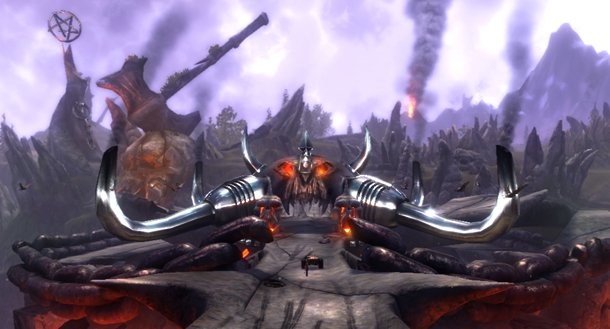
I’ve got a question about the soundtrack.
Mm-hmm.
It’s kind of big.
Yeah.
And I think what’s most exciting about it is it’s not just the obvious selections; you’ve got Motorhead in there, you don’t have Ace of Spades. Is that something you had to battle with publishers over that stuff?
No. I mean we had to fight for that many songs, but a lot of it was just because we didn’t think we’d be able to get them all, so we kept pushing for more back up. And they kept asking for more back up plans, in case we didn’t get them, and then we ended up getting them all and we were like “Wooh!” So no, we definitely – and that was another great thing – I mean you never know what would happen if we’d started with a publisher; when the clay is unformed people tend to want to get in there and form it with you. But we were already pretty set in our metal ways by the time we started with EA, and I think they could see how natural that music was. And it was such a – I mean I knew that we needed the support of metal fans, even though the game is for metal fans and metal haters alike, I think there’s enough fun and action in there for people who don’t like metal. But I knew we really couldn’t do it without metal fans; if they wrote up in a metal magazine that this game sucked, it would just be the worst. So I was really – and metal fans are really particular, and none of them have the same opinion about what’s true metal. Like that Manowar, that really divides some people. There are some people who are like, “No, this is some really serious stuff,” and other people are like, “This is a joke!” [laughing]. And so what we tried to do was really just cover all bases and be really inclusive and have every subgenre in there represented well, but then also, yeah, not pick the – pick some bands that are really good that people don’t really know about, like Brochas Helm and then mix it with the bands that are the classics that I grew up with like Ozzy and Sabbath and Priest and stuff. But not pick their obvious songs most of the time; we didn’t pick Ace of Spades because it’s been in commercials, it’s been in video games, it’s been in – and it’s a great song, and I was just in a mosh pit last Monday, watching Motorhead play it, and it’s still a great song, but… After the session where we recorded Lemmy’s voice, I got to ride around with him in his car, and I asked him what was his favorite Motorhead album, and he said Inferno, which I didn’t even have yet, it’s one of their newer albums. And I was like, “I don’t have that album,” and I listened to it and it’s awesome, and it’s like, “This is a great album,” and so we put the song In the Black from the album on there, because that was my favorite song on that album. But also we had The Road Crew, just because that’s so appropriate to the – it’s one of the only songs about roadies. And then Black Sabbath, like having Symptom of the Universe on there, because that’s such a great song, but it’s on Sabotage; that’s the album that only real Sabbath fans get that far into the catalogue, mostly people get into the first three albums then stop. But having that in there – and personally Never Say Die, that’s a song that even Sabbath fans don’t like [laughing]. But when you hear it in context – the moment we play it, it’s the perfect song, and it’s a great song, and you’ll realize that it’s an underrated album, and everyone’s going to like it. And then on top of it all we have some Motley Crue and Def Leppard and really recognizable things that you have heard before, but they are perfect for that moment in the game.
So were there any high profile songs that you really wanted to get in there but you just couldn’t for whatever reason?
Now here’s my question – let me answer your question with a question…
Oh yeah…
Why do people always ask this question?
Because I was going to ask you “Are games art?” but then I didn’t want to.
[Laughing]. People always want to know – are you writing an article about my tears and disappointments? Is that the theme of the article, “Things Tim Can’t Have”?
Yeah, just wait until your daughter tells you to go away… That will hurt you in ways you can’t yet imagine.
[Laughing] No, mostly we got I think 98 percent of the songs we wanted. There’s some – it would have been cool to have Led Zepplin, but no one gets Led Zepplin. So mostly –
Isn’t that how it always works: you give people a hundred songs and then the question is why isn’t “this” there?
Yeah – well the fact that they can point at a couple of really conspicuous bands that are missing shows how complete the soundtrack is, you know what I mean?
Yeah. Are there plans to put the soundtrack out in alternate form?
I wish, but you know what? I think our lawyers are tired [laughing]. Licensing just to get it in the game was like two years at least of work, for a team of about four people. So I think to make a soundtrack – I found out that going through record labels and stuff is even more of a pain in the ass. I would love to though – I would love to put it out as a double vinyl.
Oh that would be awesome. They’d have to be really big records though.
[Laughing].
And today you announced you’ve got some Rock Band DLC coming out next week…
Yeah, it’s exciting.
It’s very exciting... Could we get more?
Yeah, it’s only three songs… It should be – yeah, I think people underestimate what it takes to make Rock Band DLC. I definitely did, I was like, “Hey, how about 108 songs?” And it’s like, “Actually those would take a little more work than you might think.” Because they have to make them playable, and they also have to be the right songs to be fun to play, and stuff. There’s so much work going into it and so much – and so many songs in the pipe that they’re working on getting released and stuff, so I think we’re lucky to get those three songs in there.
Cool. I guess I’ve got one last question for you – I want to hear your honest reaction when I ask you this question, I don’t want the question answered… So if I were to ask, “Are adventure games dead?” What’s your immediate response to that?
[Laughing]. You know for a while I just stopped answering that question, because it seemed so obvious and stuff, but it seems like they’ve kind of punched their fist out of their grave, and pulled their stinking bodies back into the world and they’re eating the brains of gamers again.
Well, there you go.
Yeah, I mean I’ve heard – I don’t know the numbers, but I’ve heard the Monkey Island release was really successful, and so... And Telltale has never stopped, so those guys have been making – Dave Grossman has never stopped making adventure games since the old days, so…
I have to say it was really crazy going back to Monkey Island because I played it originally on my Amiga 500 and I did not have a hard drive – that game is significantly quicker paced when it’s streaming off a hard drive and you don’t keep swapping out 3.5” floppies.
Well the problem is that doesn’t give you any chance to think about the puzzles.
OK, I lied. I’ve got one more question.
OK…
The little game you guys did for the GDC awards…
Mm-hmm.
That was completely awesome, and I just – what was the story behind that? Because it was clearly something you guys did not have to do, and there’s obviously so much love and care put into it…
Oh, not that much [laughing].
Oh, it felt like it – you’re a tremendous faker.
No actually our web guy just likes to make Flash games. He made all the Flash games on our site, and he sent me the demo of just me walking around in a tux – actually from the first time I hosted the show, he wanted to do it back them. And I was like, “I don’t know if want to…” we kind of hemmed and hawed about it. And then he was like, “Hey, you’re hosting again, look at this.” And I was like, “Okay, can we do it as a demo for the show?” And then he made it all by himself – with some music help from some of the guys – but he made it all by himself, and then I went and did a pass on the dialogue, and that was that.
Yeah, that’s exactly – with Xbox Live Arcade releases like that, you’d make so much money…
[Laughing]
Free advice from someone who’s not qualified to give it.
